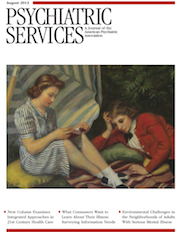Integrated Care: Wellness-Oriented Peer Approaches: A Key Ingredient for Integrated Care
Abstract
People with lived experience of mental illness have become leaders of an influential movement to help the mental health system embrace the notion of whole health and wellness in the areas of advocacy, policy, and care delivery. Wellness-oriented peer approaches delivered by peer-support whole-health specialists and wellness coaches can play an important role in integrated care models. This column examines the wellness definitions and peer models and some specific benefits and tensions between the peer-oriented wellness approach and the medical model. These models can work in unison to improve health and wellness among people with mental and substance use disorders.



